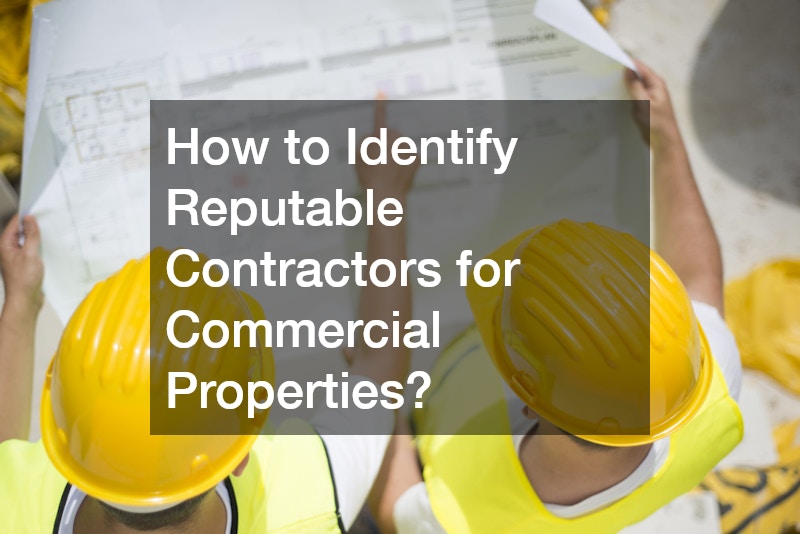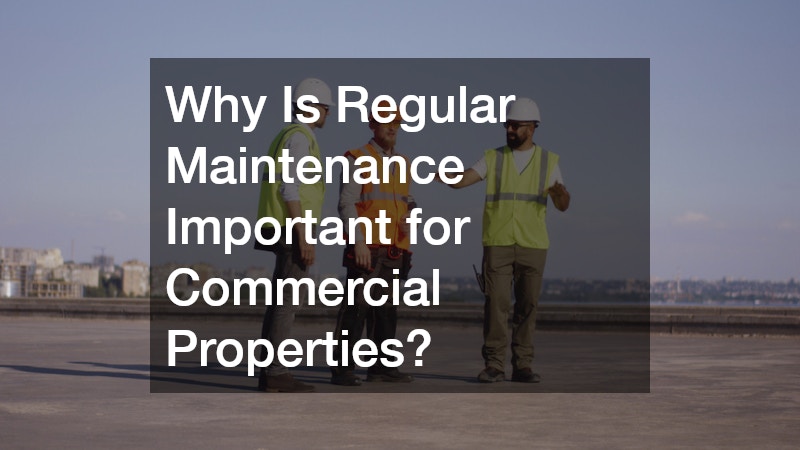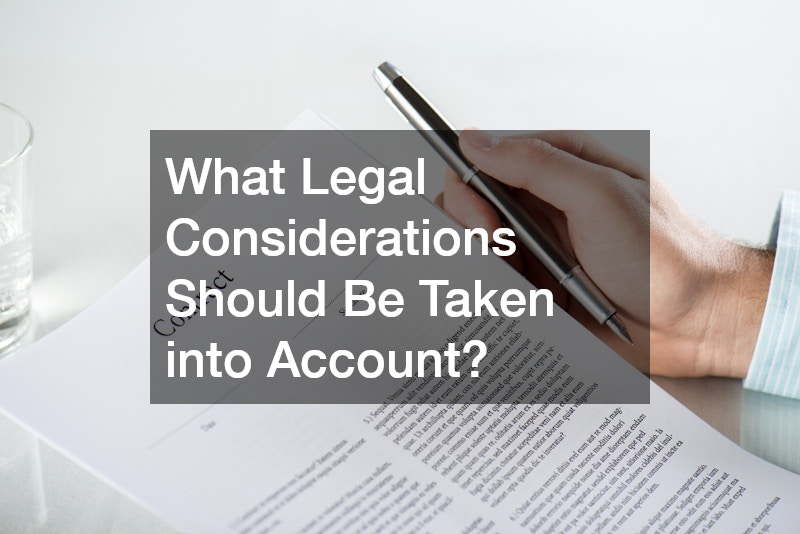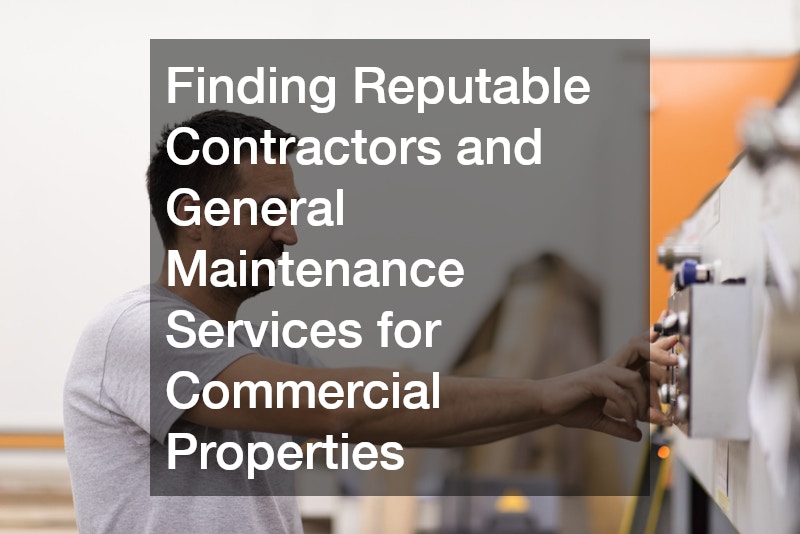Maintaining a commercial property involves more than simply keeping it clean and functional. It requires the expertise of a network of professionals to handle everything from system inspections to emergency repairs. Whether you’re overseeing a single office building or managing multiple retail spaces, finding reputable contractors and general maintenance services is crucial. The right support not only safeguards the property’s structural integrity but also upholds tenant satisfaction and ensures regulatory compliance. This article provides a detailed roadmap for locating trustworthy service providers and explains how to establish effective property management practices that keep commercial facilities running smoothly.
How to Identify Reputable Contractors for Commercial Properties?

Understanding Licensing and Certification
One of the first steps in finding a reputable contractor is verifying their licensing and certifications. A licensed contractor indicates compliance with local and state regulations, ensuring they possess the minimum required qualifications for the job. Whether hiring an HVAC contractor for system installations or a fence contractor to secure the perimeter of your facility, proper licensing protects your investment and mitigates liability risks.
Importance of Checking References and Reviews
Before entering into any agreement, it’s essential to review the contractor’s track record. Online platforms, local business directories, and testimonials offer insights into their reliability and quality of service. For example, a commercial property owner seeking commercial roofing repairs can benefit from reviewing client feedback on local roofers to assess punctuality, responsiveness, and overall workmanship.
Assessing Experience and Specialization
Every commercial property is unique. A contractor who specializes in one service may not be equipped to handle others. Look for providers with industry-specific expertise. For instance, audio visual contractors are best suited for enhancing conference rooms and digital signage systems, while specialists in commercial garage door systems are critical for warehouses and distribution centers. Understanding a contractor’s niche ensures that the right skill set is applied to the right task.
Verifying Insurance and Bonding
Contractors working on commercial properties should carry liability insurance and be bonded. This coverage provides protection in the event of property damage, on-site injuries, or unfinished work. Insurance verification is especially important for high-risk tasks like commercial roofing repairs or electrical system upgrades. Never hesitate to ask for documentation before work begins.
Evaluating Communication and Professionalism
The ability to communicate effectively is often a clear indicator of professionalism. Prompt replies, transparent pricing, and detailed proposals demonstrate a contractor’s commitment to quality. Whether coordinating with a local construction management team or an individual HVAC contractor, good communication lays the foundation for successful, long-term working relationships.
What General Maintenance Services Are Essential for Commercial Buildings?
HVAC System Maintenance
An HVAC contractor plays a critical role in ensuring heating, ventilation, and air conditioning systems are operating efficiently. Routine inspections, filter replacements, and duct cleaning prevent breakdowns and improve indoor air quality, which is vital for tenant comfort and regulatory compliance.
Plumbing and Water System Checks
Leaking faucets, clogged drains, and malfunctioning water heaters can disrupt business operations and lead to costly damage. Regular plumbing inspections are necessary to maintain hygiene and avoid structural complications from water infiltration.
Electrical System Inspections
Electrical systems in commercial buildings must meet stringent safety codes. Periodic inspections reduce the risk of outages and fire hazards. Contractors should be adept at handling everything from lighting maintenance to circuit breaker replacements.
Roof and Exterior Maintenance
A building’s roof is its first line of defense against the elements. Local roofers experienced in commercial roofing repairs can identify wear and tear early, minimizing the potential for leaks and structural deterioration. Exterior upkeep may also include paintwork, siding, and sealing entryways to improve both appearance and energy efficiency.
Interior Repairs and Upkeep
From replacing damaged tiles to repainting walls and maintaining common areas, interior maintenance affects both functionality and aesthetics. Services like glass service ensure that windows and storefronts remain safe, clean, and visually appealing.
Why Is Regular Maintenance Important for Commercial Properties?

Preventive Measures Against Major Repairs
Routine inspections and minor repairs can prevent more significant issues down the road. Addressing a small HVAC fault before it escalates into a full system replacement, for example, saves time and money. Preventive care is more cost-effective than reactive repairs.
Ensuring Safety and Compliance
Failure to comply with local building codes can lead to penalties or forced closures. Regular maintenance ensures fire alarms, sprinkler systems, and emergency lighting are all up to code, contributing to a safe environment for tenants and visitors alike.
Enhancing Property Value
Well-maintained commercial buildings have higher market values and are more attractive to prospective tenants and buyers. Investing in reliable services such as commercial roofing repairs, glass service, and updated electrical systems significantly improves curb appeal and structural integrity.
Extending the Lifespan of Building Components
Routine care prolongs the life of expensive assets like HVAC systems, roofing, and plumbing infrastructure. Rather than facing premature replacement costs, regular servicing extends performance and functionality.
Optimizing Operational Efficiency
A well-maintained facility operates more efficiently. Tasks like updating lighting to LED, servicing climate control systems, or scheduling regular cleaning improve workplace productivity and reduce energy consumption.
How to Assess the Cost of Maintenance Services?
Understanding the Scope of Work
Clearly define what the service entails. A proposal to install garage doors should specify door type, materials, labor, and warranty. Transparent scopes of work help eliminate ambiguities and protect against hidden fees.
Comparing Quotes from Multiple Contractors
Never settle for the first estimate. By sourcing quotes from multiple professionals—including fence contractors, HVAC technicians, and electrical specialists—you get a better sense of market rates and service standards.
Considering Long-term Cost Implications
It may be tempting to choose the cheapest contractor, but long-term reliability and maintenance should also factor into your decision. A low upfront cost might lead to higher expenses later if the workmanship is poor or the components wear out quickly.
Negotiating Contracts and Service Agreements
Review contracts thoroughly before signing. Ensure that maintenance frequency, response times, and dispute resolution clauses are clearly defined. Whether hiring audio visual contractors or a roofing team, contracts should protect both parties and ensure mutual accountability.
Allocating Budgets for Unexpected Expenses
Unexpected issues can arise at any time, from plumbing emergencies to vandalism or storm damage. Smart property management involves setting aside a contingency fund for these scenarios to avoid disruptions and maintain tenant satisfaction.
What Are the Key Indicators of Poor Maintenance Practices?
Frequent Repairs and Breakdowns
If the same systems or structures require repeated repairs, it’s a sign of poor initial work or substandard maintenance. Constant issues with the HVAC system or commercial garage door mechanisms should prompt a reassessment of the current service providers.
Inconsistent Service Records
Detailed logs help track the history of all maintenance and repairs. Incomplete or missing records hinder your ability to monitor trends and plan proactively.
Rising Utility Bills without Clear Cause
Sudden spikes in energy or water bills may signal underlying problems. For example, a poorly maintained HVAC system can drive up energy usage, while unnoticed plumbing leaks waste water and money.
Negative Tenant or User Feedback
Tenant satisfaction is a valuable indicator of facility health. Complaints about recurring issues, cleanliness, or delayed responses are red flags pointing to maintenance shortcomings.
Non-compliance with Building Regulations
Failing inspections or receiving warnings from local authorities often stems from neglect. Regular compliance checks and updates ensure your property meets all legal standards.
How to Transition Between Contractors Smoothly?

Effective Communication Strategies
Inform all stakeholders about the transition timeline and expectations. Whether you’re replacing a fence contractor or switching glass service providers, clear communication avoids misunderstandings.
Detailed Handover Processes
Provide incoming contractors with comprehensive records, including service history, equipment manuals, and points of contact. A thorough handover reduces downtime and enhances service continuity.
Overlapping Transition Schedules
When possible, allow a brief overlap between outgoing and incoming contractors. This facilitates training, questions, and ensures responsibilities are fully transferred.
Maintaining Documentation and Records
Keep copies of all contracts, receipts, and service logs. These records are critical for evaluating performance and providing a legal trail if disputes arise.
Monitoring Transition Outcomes
Assess the effectiveness of the transition by monitoring service quality, tenant satisfaction, and cost efficiency. Make adjustments quickly if performance does not meet expectations.
What Role Do Facility Managers Play in Maintenance?
Coordinating Between Contractors and Tenants
Facility managers act as liaisons, ensuring that contractor activities align with tenant schedules and business operations. They coordinate everything from commercial roofing repairs to fire alarm inspections.
Developing Maintenance and Repair Schedules
Creating and enforcing preventive maintenance calendars is a key responsibility. This helps avoid conflicts and ensures timely servicing.
Inspecting Work Quality and Completion
Facility managers must regularly inspect the quality of completed work. This ensures that standards are met and that issues are promptly addressed.
Budgeting and Financial Oversight
From sourcing competitive quotes to approving payments, facility managers manage maintenance budgets and track expenditures to maintain financial health.
Crisis and Emergency Management
During emergencies like power outages or flooding, facility managers are the first responders. They coordinate with service providers to restore operations quickly and safely.
How to Use Technology to Enhance Maintenance Services?
Implementing Maintenance Management Software
Computerized systems can streamline scheduling, work orders, and performance tracking. These platforms improve visibility and coordination across all maintenance activities.
Utilizing IoT for Real-time Monitoring
Internet of Things (IoT) devices enable real-time monitoring of HVAC systems, lighting, and security setups. Early warnings reduce downtime and prevent equipment failure.
Scheduling Preventive Maintenance with Predictive Analytics
Data analytics can predict when systems are likely to fail, allowing for maintenance to be scheduled proactively. This minimizes operational disruption and extends equipment life.
Enhancing Communication with Digital Platforms
Tools like mobile apps and cloud-based portals facilitate faster communication between property managers and contractors. Updates, approvals, and documentation can be shared instantly.
Analyzing Data for Process Improvements
Maintenance data reveals trends and inefficiencies. Property managers can use these insights to fine-tune schedules, reduce costs, and improve service quality.
How Can Sustainability Be Incorporated in Maintenance Practices?
Eco-friendly Cleaning Products
Using non-toxic, biodegradable cleaners protects the environment and enhances indoor air quality, benefiting tenants and employees alike.
Energy-efficient Equipment and Lighting
Installing LED lighting, motion sensors, and energy-star appliances reduces operational costs and carbon footprints.
Water Conservation Techniques
Low-flow fixtures, rainwater harvesting systems, and regular leak inspections contribute to sustainable water usage.
Waste Reduction and Recycling Programs
Implementing recycling programs and responsible waste disposal supports corporate sustainability goals and improves tenant satisfaction.
Green Building Certifications
Striving for LEED or other green certifications boosts property value and signals a commitment to sustainable operations. Partnering with contractors who understand green building practices is crucial for success.
What Legal Considerations Should Be Taken into Account?

Understanding Compliance with Local Building Codes
Regular updates to municipal codes can impact your obligations. Contractors should be familiar with these codes to ensure all work meets current standards.
Contractor Licensing and Liability Issues
Always verify licensing and confirm that contractors carry liability insurance. This is critical for high-risk services like commercial roofing repairs or installing high-voltage systems.
Contract Clauses and Legal Agreements
Include performance benchmarks, dispute resolution procedures, and clear termination clauses in every contract. This helps avoid legal entanglements and ensures accountability.
Tenant Maintenance Responsibilities
Clarify which maintenance duties fall under tenant responsibilities. This should be outlined in lease agreements to prevent future misunderstandings.
Legal Recourse in Case of Disputes
Have a clear process in place for handling disputes, including legal counsel and arbitration options. Strong documentation and detailed contracts offer essential protection.
Final Thoughts
Maintaining a commercial property is far more than a series of routine tasks—it’s a strategic endeavor that affects every aspect of business operations. Whether it involves selecting the right HVAC contractor, scheduling commercial roofing repairs, or partnering with trusted local roofers, the decisions made around property upkeep have a direct impact on tenant satisfaction, regulatory compliance, and long-term asset value. In today’s fast-paced commercial landscape, businesses cannot afford to overlook the importance of working with experienced professionals who are licensed, insured, and reliable.
Finding reputable contractors means doing more than scanning a list of names. It requires a thoughtful vetting process that includes checking certifications, assessing past performance, and ensuring that each contractor or service provider aligns with your property’s unique needs. From audiovisual contractors who support modern office functionality to fence contractors who provide security and privacy, the variety of specialties needed in commercial maintenance demands attention to detail and strong decision-making skills.
Once reliable providers are in place, implementing a proactive and well-organized maintenance program becomes the key to property longevity. Regular servicing of HVAC systems, plumbing, electrical networks, and building exteriors ensures that your commercial spaces remain safe, functional, and energy-efficient. Services like glass service, commercial garage door maintenance, and interior repairs must be scheduled with precision and executed to high standards in order to prevent operational disruptions and tenant dissatisfaction.
